Dental Implants
Most people are candidates for Dental Implants regardless of their age. Hundreds of thousands of patients have them placed each year.
Most people who have lost one or more teeth might feel too self-conscious to smile or talk. By replacing a missing tooth, people will be able to eat the foods they enjoy. Additionally, implants help stimulate and maintain jaw bone, preventing bone loss and helping to support facial features. Dental implants act as man-made roots for artificial teeth, including various prosthesis including dental crowns, dental bridges, and dentures. A crown or other restoration is then placed on the post, providing a normal feel and function of a natural tooth.
Today’s dental restorations are virtually indistinguishable from other teeth and if cared for properly, it can remain in place for more than 40 years.
At Dartmouth Periodontics and Implant Dentistry, we can design a treatment plan that will help you to achieve the stable, natural-looking, beautiful smile that you have always dreamed of having.
What type of Dental Implant Surgery is best for me?
This depends on several factors that will be evaluated by our team of oral surgerons including your overall systemic health, number and location of missing teeth, whether any tooth extraction is required, and the condition of your jawbone. We will be able to help with any tooth extraction or bone grafting required, as well as placement of the implants and posts.
The number of dental implants needed will depend on various factors such as the location and number of missing teeth, as well as the type of prosthesis chosen. Today, we have the ability to grow bone where needed. This not only gives us the opportunity to place implants of proper length and width, it also gives us a chance to restore functionality and esthetic appearance.
DID YOU KNOW?
Contrary to popular belief, pain is not the only sign or main indicator that something is wrong with your teeth, and just because you don’t feel any pain doesn’t mean that there isn’t disease present.
Regular visits to a periodontist are very important to assess any potential problem and address them before it does start to hurt you.
If your teeth are failing due to gum disease, a dental implant treatment option can be a life changing decision. In addition to providing you with a gorgeous smile and incredibly strong teeth for chewing food without worry, this procedure also improves your overall health and restores your confidence.
Dental Implant Procedure
Dental implants are metal anchors, which act as tooth root substitutes. They are surgically placed into the jawbone. Small posts are then attached to the implant, which protrude through the gums. These posts provide stable anchors for artificial replacement teeth.
For most patients, the placement of dental implants involves two surgical procedures. First, implants are placed within your jawbone. For the first three to six months following surgery, the implants are beneath the surface of the gums, gradually bonding with the jawbone. You should be able to wear temporary dentures and eat a soft diet during this time. At the same time, your restorative dentist designs the final bridgework or denture, which will ultimately improve both function and aesthetics.
After the implant has bonded to the jawbone, the second phase begins. The surgeon will uncover the implants and attach a small healing collar. The doctor can then start making your new teeth. An impression must be taken. Then posts or attachments can be connected to the implants. The replacement teeth are then made over the posts or attachments. The entire procedure usually takes six to eight months. Most patients do not experience any disruption in their daily life.
Single Tooth Replacements
Modifying adjacent teeth to create a standard bridge is no longer the standard of care for replacing a single tooth. A dental implant eliminates the need to violate your existing teeth, while giving you the look and feel of a natural tooth. The implant replaces the missing tooth while giving longer healthier life to its neighboring teeth.

Single tooth missing
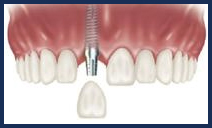
Replacement of a single tooth
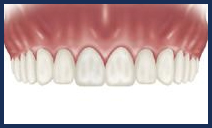
Final Result
Replacing Multiple Teeth
Multiple dental implants replace uncomfortable partials by eliminating metal clasps and adhesives. Partials rest on the gum leaving a void where your natural tooth roots one were, resulting in bone loss. Implants mimic the natural tooth root keeping your adjacent teeth and jaw bone healthy long-term.
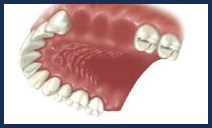
Three teeth missing
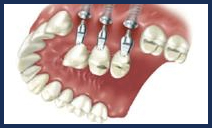
Placement of crowns on the implants
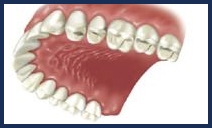
Final Result
Implant Supported Denture
Unsupported dentures rest on the gum tissue causing discomfort, irritation, and pressure that ultimately lead to bone loss. Dental implants stimulate the jaw bone and provide separation from the gum tissue, there by, maintaining long-term bone quality. Dental implants allow you yo speak, chew and smile with confidence.
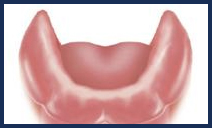
Before
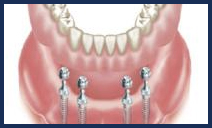
Denture is attached to implants
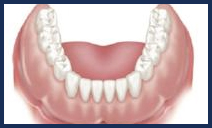
Denture snapped into place: final result
Dentures
The following is the information regarding dentures, although we DO NOT offer this service and we DO NOT always recommended, we can help you decide upon this or alternative treatments such as dental implants which could be used in conjunction with dentures. We are here to help you decide what choice is the best one for you according to your situation, budget and desires.
A denture or a complete denture as it is often called, is an appliance that is inserted in the mouth, replaces natural teeth and provides support for the cheeks and lips.
Most dentures are made of acrylic and can be fabricated two different ways.
- A conventional denture is made after all teeth have been extracted and the tissues (gums) have healed.
- An immediate denture is fabricated and inserted immediately after the teeth are extracted and the tissues are allowed to heal under the denture.
- An upper denture has acrylic, usually flesh colored, that covers the palate (roof of the mouth).
- A lower denture is shaped like a horseshoe to leave room for the tongue.
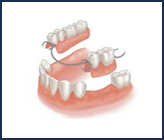
Partial Denture
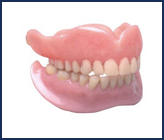
Complete Dentures
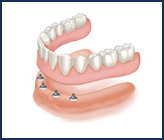
Implant Supported Denture
The teeth are made of plastic, porcelain or a combination thereof. Dentures can be fabricated to fit over endodontically treated teeth and a complete denture can be attached to dental implants to allow for a more secure fit of the appliance.
Dentures over a normal course of time will wear and need to be replaced or relined in order to keep the jaw alignment normal. The alignment will slowly change as the bone and gum ridges recede or shrink due to the extraction of the teeth. Regular dental examinations are still important for the denture wearer so that the oral tissues can be checked for disease or change.
